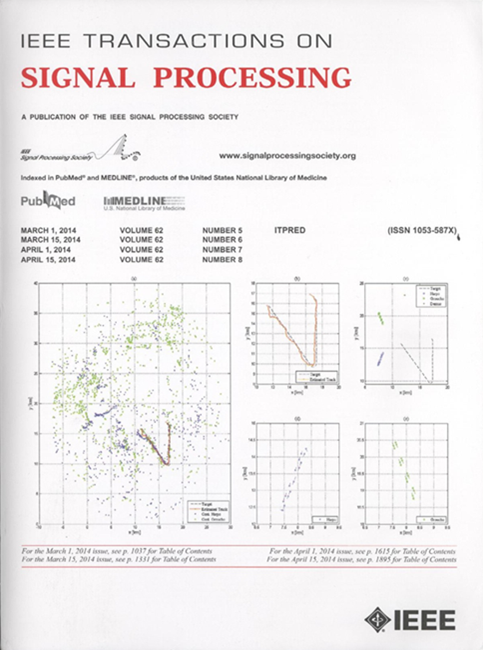轻量级顺序SBL算法的理论与实践:一种替代OMP的算法
IF 5.8
2区 工程技术
Q1 ENGINEERING, ELECTRICAL & ELECTRONIC
引用次数: 0
摘要
针对稀疏信号恢复问题,提出了一种基于稀疏贝叶斯学习(SBL)的低复杂度前向选择算法。所提出的算法被称为轻量级顺序SBL (LWS-SBL),它为广泛使用的迭代贪婪算法正交匹配追踪(OMP)提供了一种替代方案。与OMP将未知稀疏向量建模为确定性变量不同,LWS-SBL将其建模为随机变量。具体地说,该算法是从随机最大似然估计框架中衍生出来的,它迭代地选择最大似然增加的列。我们推导了有效的递归过程来更新算法的内部参数,并保持了与OMP相似的渐近计算复杂度。另外两种观点,一种基于阵列处理波束形成解释,另一种基于局部高分辨率分析,提供了理解两种算法机制的潜在差异。它们揭示了LWS-SBL优于OMP的途径。这些在数值剖面中得到了验证,以改善支撑回收性能。与OMP中的对应方法类似,对于涉及参数字典的SSR问题,通过扩展LWS-SBL以无网格方式恢复多维参数,证明了所提方法的灵活性。本文章由计算机程序翻译,如有差异,请以英文原文为准。
Theory and Practice of Light-Weight Sequential SBL Algorithm: An Alternative to OMP
We propose a low complexity forward selection algorithm for the sparse signal recovery (SSR) problem based on the sparse Bayesian learning (SBL) formulation. The proposed algorithm, called as light-weight sequential SBL (LWS-SBL), offers an alternative to the widely used iterative and greedy algorithm known as orthogonal matching pursuit (OMP). In contrast to OMP, which models the unknown sparse vector as a deterministic variable, the same is modeled as a stochastic variable within LWS-SBL. Specifically, the proposed algorithm is derived from the stochastic maximum likelihood estimation framework, and it iteratively selects columns that maximally increase the likelihood. We derive efficient recursive procedure to update the internal parameters of the algorithm, and maintain a similar asymptotic computational complexity as OMP. Additional two perspectives, one based on array processing beamforming interpretations and the other based on a local high-resolution analysis, are provided to understand the underlying differences in the mechanisms of the two algorithms. They reveal avenues where LWS-SBL improves over OMP. These are verified in the numerical section in terms of improved support recovery performance. Similar to the counterparts in OMP, for SSR problems involving parametric dictionaries, the flexibility of the proposed approach is demonstrated by extending LWS-SBL to recover multi-dimensional parameters, and in a gridless manner.
求助全文
通过发布文献求助,成功后即可免费获取论文全文。
去求助
来源期刊

IEEE Transactions on Signal Processing
工程技术-工程:电子与电气
CiteScore
11.20
自引率
9.30%
发文量
310
审稿时长
3.0 months
期刊介绍:
The IEEE Transactions on Signal Processing covers novel theory, algorithms, performance analyses and applications of techniques for the processing, understanding, learning, retrieval, mining, and extraction of information from signals. The term “signal” includes, among others, audio, video, speech, image, communication, geophysical, sonar, radar, medical and musical signals. Examples of topics of interest include, but are not limited to, information processing and the theory and application of filtering, coding, transmitting, estimating, detecting, analyzing, recognizing, synthesizing, recording, and reproducing signals.
 求助内容:
求助内容: 应助结果提醒方式:
应助结果提醒方式:


